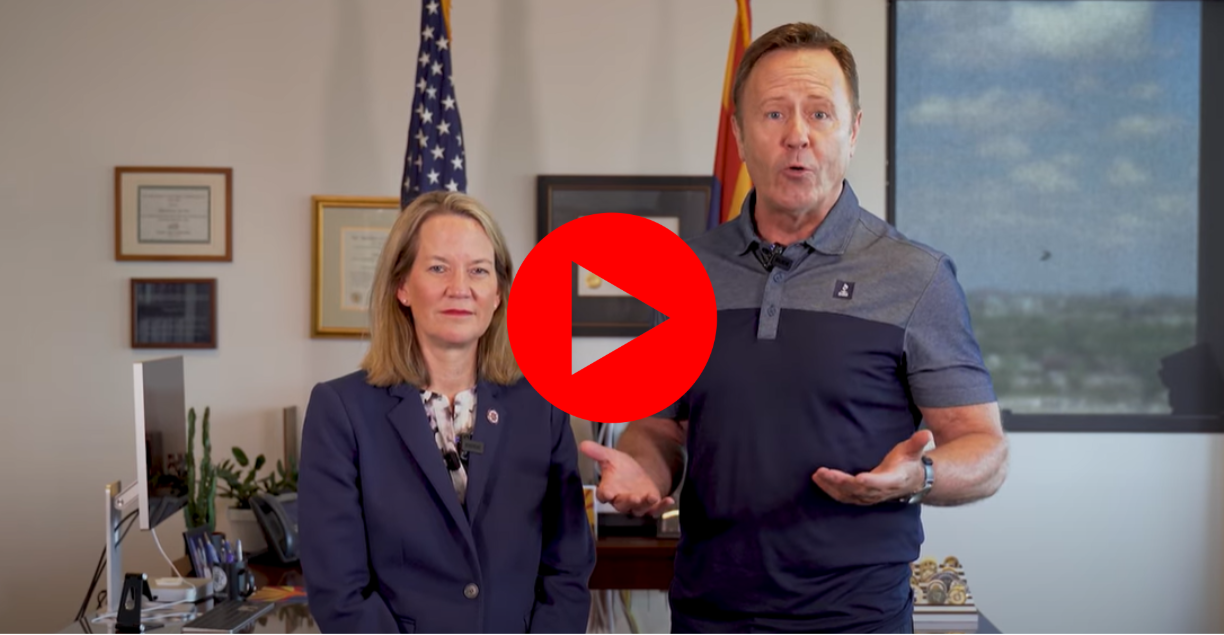Attorney General Mayes Partners with BBB to Protect Arizonans from Scams with New Consumer Educational Campaign



VIDEO: AG Mayes and the Better Business Bureau Combat Celebrity Scams
VIDEO: How to Avoid Moving Scams with the Better Business Bureau's Joe Ducey
VIDEO: AG Mayes and the Better Business Bureau Fight AI Scams
VIDEO: AG Mayes and the Better Business Bureau Fight Crypto Scams
PHOENIX – Today, Attorney General Kris Mayes announced that her office is partnering with Better Business Bureau (BBB) to launch a consumer educational campaign to empower Arizonans to spot and avoid scams. In a series of video PSAs, Attorney General Mayes and ex-TV newsman Joe Ducey will share tips and warnings to help Arizona consumers avoid losing money and personal information to fraudsters. The first video focuses on fraudulent celebrity advertisements. Topics will also include moving scams, bitcoin and cryptocurrency scams, and scams using AI.
“Consumer protection is my number one priority. From rental scams to robocalls, my team is aggressively investigating deceptive business practices and fraud schemes reported across the state,” said Attorney General Kris Mayes. “I'm proud to partner with BBB to make sure more Arizonans have the information they need to avoid future fraud.”
“Attorney General Mayes is a huge proponent of scam prevention, especially for seniors, and that’s why it’s so great to partner on this video campaign to share do’s and don’ts around common scams in Arizona,” said BBB’s Associate Vice President of Public Engagement and Investigative Outreach Joe Ducey. “By choosing to be smarter on the front end and doing your research with BBB, you can save yourself a headache—and potentially your hard-earning savings—on the backend.”
In 2024, a report from the FBI's Internet Crime Complaint Center indicated that Arizonans lost an estimated $392 million to fraud. In the same year, the Arizona Attorney General’s Office (AGO) received nearly 22,000 consumer complaints from Arizonans; answered approximately 28,775 phone calls; and reviewed over 23,000 emails from consumers reporting potential fraud. The AGO successfully and recovered a record-breaking $5.2 million on behalf of Arizona consumers harmed by scams.
The Consumer Protection and Advocacy Section at the AGO protects people – including Arizona’s most vulnerable residents – from fraudsters and scammers, and from all types of deceptive and harmful business practices by enforcing Arizona’s consumer protection laws and other state and federal law. If you believe you have been a victim of consumer fraud, you can file a consumer complaint by visiting the Attorney General’s website. If you need a complaint form sent to you, you can contact the Attorney General’s Office in Phoenix at (602) 542-5763, in Tucson at (520) 628-6648, or outside the Phoenix and Tucson metro areas at (800) 352-8431. You can also report scams to the FTC.
BBB helps consumers make informed buying decisions and is a go-to resource for trusted consumer information, consumer tips and scam alerts. Consumers can also report scams and fraud attempts through BBB's Scam Tracker, which helps identify scam tactics and trends.
Celebrity Endorsement Scams
VIDEO: AG Mayes and the Better Business Bureau Combat Celebrity Scams
AG Mayes and BBB encourages consumers to follow these tips to reduce the chances of being scammed by a fraudulent celebrity endorsement:
- Slow down. Before you order the product or send money, talk with someone you trust.
- Do some research: search online for the celebrity’s name plus “scam.” Do the same with any charity or cause they’re asking you to support—and learn more about charity scams here.
- Never send money, gift cards or prepaid debit cards to someone you don’t know or haven’t met – even celebrities you meet on social media.
- Don’t trade or invest with a person you have only met online. Don’t speak of your financial position or investments with strangers online.
- Don’t share personal information or current financial status with strangers. Don’t provide your banking information, social security number, copies of your identification or passport, or any other sensitive information to anyone online or to a site that you cannot verify is authentic.
- Resist pressure to commit quickly. Be cautious of individuals who claim to have exclusive investment opportunities and urge you to act fast.
- Ask your health care professional about dietary supplements. The government doesn’t review or evaluate supplements for safety or effectiveness before they’re put on the market. Even a natural supplement can be risky depending on your health and the medicine you take, and your doctor knows your health better than a celebrity.
- Get familiar with deepfake technology. Scammers use deepfake technology to trick people. They take real video clips and photos of a person and use them to create new videos and audio clips. Deepfake images and videos can be surprisingly realistic. See this BBB article for tips on spotting deepfakes.
- Understand how AI-generated images work. With AI image generators, you can type in a few words describing the image you want to be created, and the AI generates an image based on your text. It’s valuable technology, but scammers can abuse it to create images to back up their stories, products, or outright lies.
